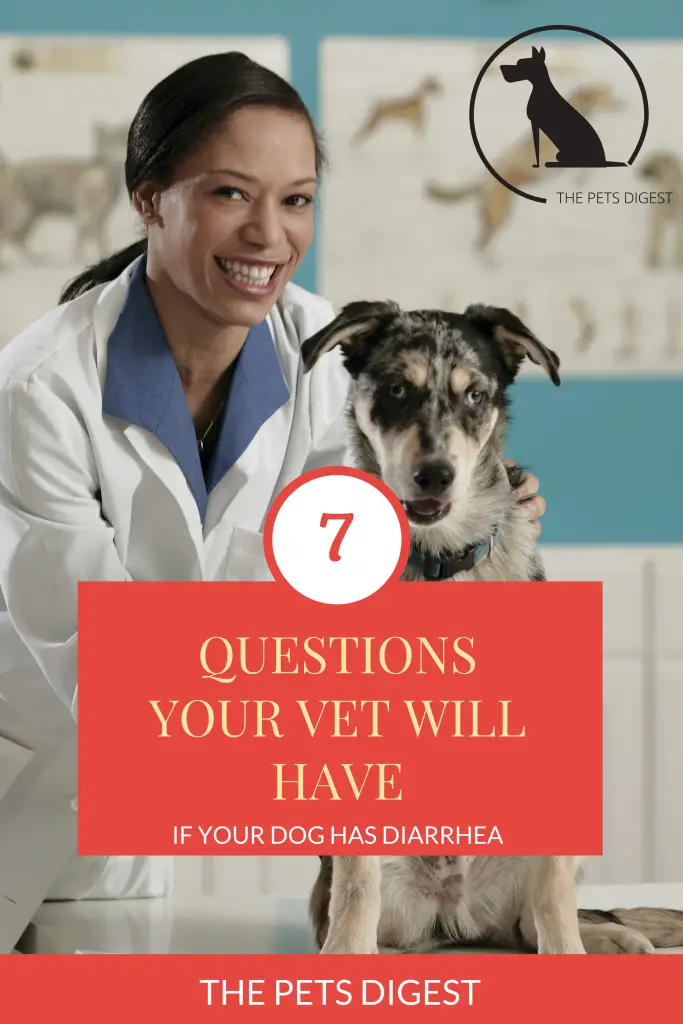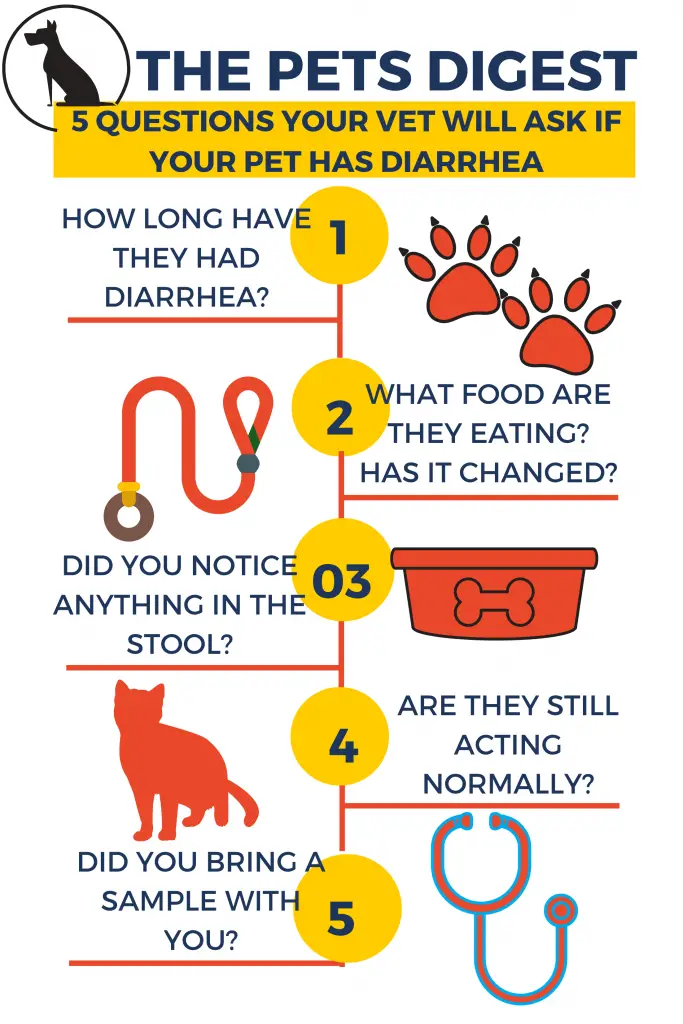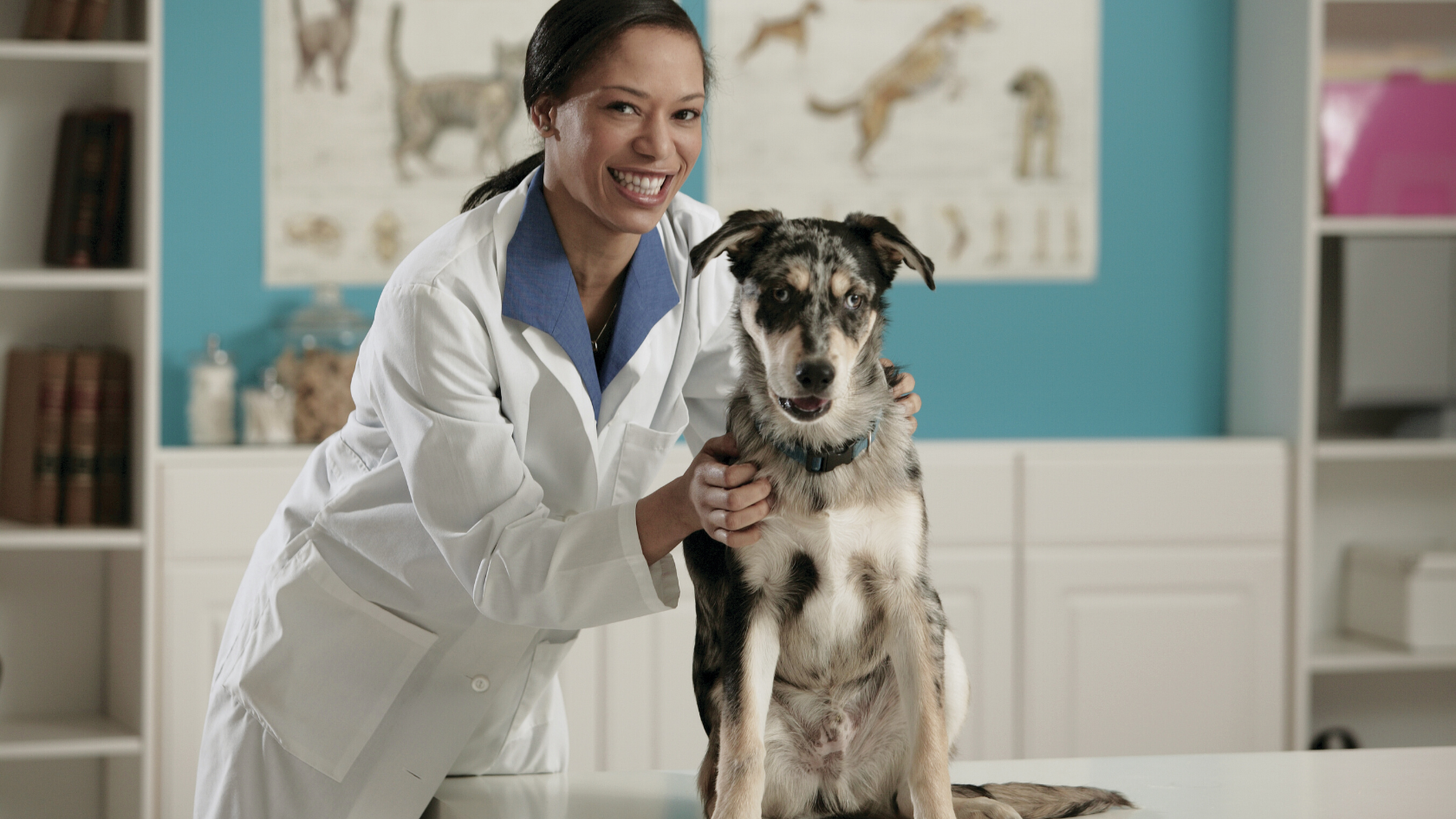When an animal presents at the veterinary clinic with diarrhea, there are a series of questions and possibly tests that may need to be run to find the root cause.
In some cases, it is merely a food change or something simple, but in others, it is not. This is why we want you to be prepared when you take your dog to the vet for diarrhea continue reading to see what questions your vet will ask you and what you need to bring with you for your vet visit.
Keep reading to find out why your dog has chronic diarrhea, what you can do about it, and what to take with you to the vet’s office.
What is chronic diarrhea in dogs?
Chronic diarrhea or chronic enteropathy is when a dog has had diarrhea at least for at least 2 weeks. This includes diarrhea that responds to treatment but consistently returns.
What Causes of Chronic Diarrhea in Dogs?
Just like in humans, there can be many causes of chronic or persistent diarrhea in dogs. Some of the most common include:
- Dietary Indiscretion: eating garbage, table food, or something from the ground like grass
- Infectious causes: such as bacteria, fungi, or viruses like parvovirus
- Worms: like roundworms, whipworms, or hookworms
- Parasitic infections: like giardia or coccidia
- Cancers: cancers like GI growths may cause some diarrhea
- Diseases: colitis, IBD, IBS can call cause chronic inflammation and diarrhea in dogs
- Food allergies: many dogs are allergic to chicken
- Food Intolerance: similar to allergies
Can I treat my dog’s diarrhea at home?
Many pet owners do start off attempting to treat their dog’s diarrhea at home using the following.
Bland diet
If you believe that your dog’s chronic diarrhea may be due to something they ate and they have an upset stomach you can try feeding them a bland diet.
Dewormer
Many owners actually see the problem in their dog’s stool when they see long white wiggly worms come out with the poop. In this case, you can use an over-the-counter dewormer, however, still visit your vet and get a fecal done to ensure the dewormer took care of the worms as different dewormers treat different worms.
Over-the-counter medications
There are many medications that humans take for diarrhea that work for dogs including Pedialyte. However, you need to speak with your veterinarian first to prevent giving too much (or too little) for your dog’s size and to ensure you have the correct product. Here are some over-the-counter medications that you should have if your dog suffers from chronic diarrhea.
Fiber
Fiber can help to regulate your dog’s stool
If you have a dog that has diarrhea off and on you should have these 7 things on hand at all times.

When should I see a veterinarian about my dog’s chronic diarrhea?
If your dog has had watery or soft (think soft serve ice cream) for more than three days and it is not clearing up with a bland diet, you should see your vet.
If your dog has concomitant vomiting and other signs of illness such as lethargy and inappetence (not wanting to eat) you should see your vet as soon as possible.
How long is too long for a dog to have diarrhea?
If your dog has diarrhea for weeks due to unknown causes can lead to some serious health issues in your dog.
While rare, chronic diarrhea can become an emergency as persistent and long-term diarrhea can cause issues in dogs including severe dehydration and malnutrition due to the increased water and nutrient loss.
If your dog’s chronic diarrhea becomes persistent it could warrant a trip to the vet’s office where they may want to do intravenous fluid therapy and keep your dog in the hospital for observation and treatment.
How Veterinarians Diagnose Chronic Diarrhea in Dogs
Your veterinarian will work to determine what the cause of your dog’s diarrhea is by systematically ruling out common causes of diarrhea like the ones listed above.
Your vet may want to do various tests including a fecal flotation, blood work, and x-rays or ultrasound depending on what they believe the issue is.
7 Questions your vet will ask when your dog has chronic diarrhea
1. How long have they had diarrhea and how often?
Your vet is trying to determine if the diarrhea is acute or chronic and if it is intermittent (meaning it comes and goes). This is important to know for many reasons, including determining if your pet needs electrolytes since there could be severe dehydration or she may want to rule out possible causes of diarrhea in general.
Make sure you keep track of when diarrhea starts so that you are able to answer this question.
2. What food is your dog currently eating and has it changed?
Write down the type of food your dog is eating, even if your veterinarian doesn’t ask this you should know. Don’t just know the brand name but know what protein source is in it as well, typically chicken, beef, or salmon.
Diarrhea can occur from changing food and from doing so too quickly, this is why it is important for your vet to know if the diet has recently changed.
3. Did your pet eat anything out of the ordinary
Similarly to the above statement, it is important to note if your dog got into the garbage as this can cause a serious bout of diarrhea
4. Do they have all of their vaccinations?
Of course, if you are a regular client your vet will have this information on file. But if not they will need to know the vaccination history, so have it handy.
Depending on the age and vaccination status of the pet, vets worry about different diseases. In young pups that present with diarrhea and no vaccinations, the concern is usually focused on a viral disease such as parvo or distemper. In an older pet that may have been vaccinated a couple of times, this would probably not be as much of a concern.
5. Did you notice anything in the stool?
Most people will remember if they saw something like a worm roaming around in their dog’s feces but may brush off something small. But make sure that you tell your vet everything. This could include foreign bodies like small pieces of plastic or string to blood.
Many times if your dog ate something like a sock or chicken bone there will be evidence in the feces
6. Are they acting like themselves?
Notice if your dog is still eating and drinking and keeping these things down. Also note if they are more lethargic, drinking excessively, or have persistent stomach pains.
If they are not acting like themselves, it many times points to a more serious issue.
7. Did you bring a stool sample?
It is music to a vet’s ears when they hear a client has brought a stool sample with them, that way they can immediately test for things like worms. While they can easily get a sample if the feces is formed it is a little bit more difficult when there is diarrhea due to it being more liquid.
If you do bring a sample make sure it is from that day, the fresher the better. Little can be done with samples that are days old.
It is always disheartening when your pet presents with diarrhea, especially if they have a chronic illness. But making sure you know these things ahead of time will help a lot at the vet visit!
Treating Chronic Diarrhea in dogs
Many times diarrhea in dogs is self-limiting but there are times when treatment is required. Veterinarians will treat your dog symptomatically depending on their diagnostic results. Many times it is as simple as deworming or changing your dog’s food other times it may require something more a more in-depth procedure like surgery.
Why won’t my dog’s diarrhea go away?
Many times dog’s that have chronic diarrhea that just will not go away or has gone away and come back may have the following issues
Giardia infection
Giardia can take months to go away sometimes. Many times when diarrhea stops and returns your dog may be reinfecting themselves. If you have any standing water, like a pond, that your dog may be getting into you should ensure they aren’t drinking from it.
Here are some other things you can do to help get rid of giardia in your dog ASAP
Cancer
If your dog suffers from gastrointestinal cancer diarrhea may persist
Gastrointestinal Disease
Issues like chronic colitis and pancreatitis can cause intermittent diarrhea for life. This is why it is so important to get a handle on your dog’s food.
Food allergies & food intolerances
If your dog suffers from food intolerances and you continue to feed your dog the same diet, diarrhea may become persistent.
References





























































































































It’s exhausting to find educated individuals on this subject, but you sound like you understand what you’re talking about! Thanks